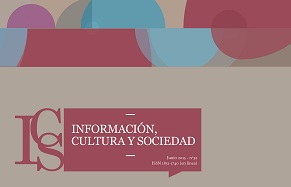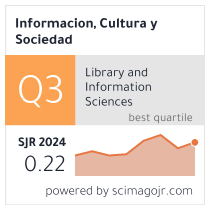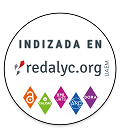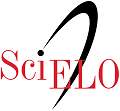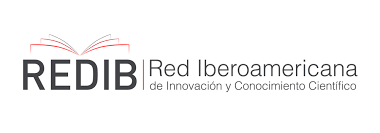Investigación interdisciplinaria e impacto social: análisis de medios sociales
Resumen
En la actualidad se considera que la investigación interdisciplinaria (IID) tiene un mayor potencial de repercusión en la sociedad que la monodisciplinaria por abordar problemas del mundo real desde perspectivas diferentes y de mayor complejidad. Sin embargo, la evidencia de esta relación entre IID e impacto investigador es escasa. El presente trabajo tiene como objetivo comprobar si la IID tiene un comportamiento diferente a la monodisciplinaria con respecto a la atención que recibe en los medios sociales. Para ello, se analizan las menciones en varios medios (Twitter, blogs, Wikipedia, noticias e informes políticos), a través de la base de datos Altmetric.com, de la producción científica española de los años 2012-2016 indexada en la Web of Science (WoS). Los artículos fueron agrupados en 175 disciplinas, según la clasificación temática de WoS incluyendo a la categoría temática “multidisciplinary”. Adicionalmente, los blogs con referencias a los artículos publicados en la categoría de Ciencias Multidisciplinares se compararon con los de las categorías de Medicina Interna y Ecología, para estudiar comparativamente la autoría y naturaleza del blog, así como la presencia de comentarios. Los resultados muestran que los artículos publicados en revistas de la categoría Ciencias Multidisciplinares están entre los más citados en los medios sociales, sobre todo en blogs y noticias. El análisis de los blogs pone de manifiesto una mayor implicación de actores ajenos a la comunidad científica con la investigación publicada en revistas de la categoría “multidisciplinary”.Descargas
Citas
Bik, Holly M. y Miriam C. Goldstein. 2013. An introduction to social media for scientists. En PLoSbiology. Vol. 11, no. 4, e1001535. <https://doi.org/10.1371/journal.pbio.1001535>
Bordons, María, Fernanda Morillo e Isabel Gómez. 2004. Analysis of cross-disciplinary research through bibliometric tools. En Moed Henk F., Wolfgang Glänzel y Ulrich Schmoch, eds. Handbook of quantitative science and technology research. Dordrecht: Springer. p. 437-456. <https://doi.org/10.1007/1-4020-2755-9_20>.
Bornmann, Lutz. 2013. What is societal impact of research and how can it be assessed? A literature survey. En Journal of the American Society for Information Science and Technology. Vol. 64, no. 2, 217-233. <https://doi.org/10.1002/asi.22803>
Bornmann, Lutz, Robin Haunschild y Werner Marx. 2016. Policy documents as sources for measuring societal impact: how often is climate change research mentioned in policy-related documents? En Scientometrics. Vol. 109, no. 3, 1477-1495. <https://doi.org/10.1007/s11192-016-2115-y>
Bray, Nancy. 2019. How Do Online News Genres Take Up Knowledge Claims From a Scientific Research Article on Climate Change? En Written Communication. Vol. 36, no.1, 155-189. <https://doi.org/10.1177/0741088318804822>
Bromham, Lindell, Russel Dinnage y Xia Hua. 2016. Interdisciplinary research has consistently lower funding success. En Nature. Vol. 534, 684-687.
Campbell, David, Philippe Deschamps, Grégoire Côté, Guillaume Roberge, Christian Lefebvre y Éric Archambault. 2015. Application of an "interdisciplinarity" metric at the paper level and its use in a comparative analysis of the most publishing ERA and non-ERA universities. En International Conference on Science and Technology Indicators. (20th: 2 - 4 Septiembre 2015: Lugano, Switzerland) Trabajos presentados. Montreal: Science-Metrix. <https://www.science-metrix.com/?q=en/publications/conference-presentations/application-of-an-interdisciplinarity-metric-at-the-paper>[Consulta: 10 septiembre 2019].
Chakraborty, Tanmoy. 2018. Role of interdisciplinarity in computer sciences: quantification, impact and life trajectory. En Scientometrics. Vol. 114, no. 3, 1011-1029. <https://doi.org/10.1007/s11192-017-2628-z>
Chen, Shiji, Clément Arsenault y Vincent Larivière. 2015. Are top-cited papers more interdisciplinary? En Journal of Informetrics. Vol. 9, no. 4, 1034-1046. <https://doi.org/10.1016/j.joi.2015.09.003>
Choi, Bernard C.K. y Anita W.P. Pak. 2006. Multidisciplinarity, interdisciplinarity and transdisciplinarity in health research, services, education and policy: 1. Definitions, objectives, and evidence of effectiveness. En Clinical & Investigative Medicine. Vol. 29, no. 6, 351-364.
Choi, Bernard C.K. y Anita W.P. Pak. 2007. Multidisciplinarity, interdisciplinarity, and transdisciplinarity in health research, services, education and policy: 2. Promotors, barriers, and strategies of enhancement. En Clinical & Investigative Medicine. Vol. 30, no. 6, e224-e232. <https://doi.org/10.25011/cim.v30i6.2950>
Collins, Kimberley, David Shiffman y Jenny Rock. 2016. How are scientists using social media in the workplace? En PlosOne. Vol. 11, no. 10, e0162680. <https://dx.doi.org/10.1371%2Fjournal.pone.0162680>
Dong, Kun, Haiyun Xu, Rui Luo, Ling Wei y Shu Fang. 2018. An integrated method for interdisciplinary topic identification and prediction: a case study on information science and library science. En Scientometrics. Vol. 115, no. 2, 849-868. <https://doi.org/10.1007/s11192-018-2694-x>
Gomes, Janaína y Homero Dewes. 2017. Disciplinary dimensions and social relevance in the scientific communications on biofuels. En Scientometrics. Vol. 110, no. 3, 1173-1189. <https://doi.org/10.1007/s11192-016-2233-6>
Harvey, Jeffrey A., Daphne van den Berg, Jacintha Ellers, Remko Kampen, Thomas W. Crowther, Peter Roessingh, Bart Verheggen, Rascha J. M. Nuijten, Eric Post, Stephan Lewandowsky, Ian Stirling, Meena Balgopal, Steven C. Amstrup y Michael E. Mann. 2018. Internet blogs, polar bears, and climate-change denial by proxy. En BioScience. Vol. 68, no. 4, 281-287. <https://doi.org/10.1093/biosci/bix133>
Haunschild, Robin y Lutz Bornmann. 2017. How many scientific papers are mentioned in policy-related documents? An empirical investigation using Web of Science and Altmetric data. En Scientometrics. Vol. 110, no. 3, 1209-1216. <https://doi.org/10.1007/s11192-016-2237-2>
Huutoniemi, Katri Ilona e Ismael Ràfols. 2017. Interdisciplinarity in research evaluation. En Frodeman, Robert, Julie Thompson Klein y Roberto Carlos Dos Santos Pacheco, eds. The Oxford Handbook of interdisciplinarity. 2nd ed. Oxford: Oxford University Press. p. 498-512. <https://helda.helsinki.fi//bitstream/handle/10138/309928/SSRN_id2818321.pdf?sequence=1> [Consulta: 27 marzo 2020]
Jacobs, Jerry A. y Scott Frickel. 2009. Interdisciplinarity: A critical assessment. En Annual Review of Sociology. Vol. 35, 43-65. <https://doi.org/10.1146/annurev-soc-070308-115954>
Jiang, Jiepu, Chaoqun Ni, Daqing He y Wei Jeng. 2013. Mendeley group as a new source of interdisciplinarity study: how do disciplines interact on Mendeley? En JCDL '13: Proceedings of the 13th ACM/IEEE-CS joint conference on Digital libraries. (13th: 22-26 Julio 2013: Indianapolis, Indiana). Trabajos presentados. Nueva York: Association for Computing Machinery. p. 135-138. <https://doi.org/10.1145/2467696.2467738>
Kjellberg, Sara, Jutta Haider y Olof Sundin. 2016. Researchers' use of social network sites: A scoping review. En Library & Information Science Research. Vol. 38, no. 3, 224-234. <https://doi.org/10.1016/j.lisr.2016.08.008>
Larivière, Vincent e Yves Gingras. 2010. On the relationship between interdisciplinarity and scientific impact. En Journal of the American Society for Information Science and Technology. Vol. 61, no. 1, 126-131. <https://doi.org/10.1002/asi.21226>
Larivière, Vincent, Stefanie Haustein y Katy Börner. 2015. Long-distance interdisciplinarity leads to higher scientific impact. En PlosOne. Vol. 10 no. 3, e0122565. <https://doi.org/10.1371/journal.pone.0122565>
Leahey, Erin, Christine M. Beckman y Taryn L. Stanko. 2017. Prominent but less productive: The impact of interdisciplinarity on scientists' research. En Administrative Science Quarterly. Vol. 62, no. 1, 105-139. <https://doi.org/10.1177/0001839216665364>
Levitt, Jonathan M. y Mike Thelwall. 2008. Is multidisciplinary research more highly cited? A macrolevel study. En Journal of the American Society for Information Science and Technology. Vol. 59, no. 12, 1973-1984. <https://doi.org/10.1002/asi.20914>
MacLaughlin, Ansel, John Wihbey y David A. Smith. 2018. Predicting News Coverage of Scientific Articles. En Proceedings of the Twelfth International AAAI Conference on Web and Social Media. Vol. 13, no. 01, 158-169. <https://aaai.org/ocs/index.php/ICWSM/ICWSM18/paper/view/17805/17010> [Consulta: 27 marzo 2020]
Mahrt, Merja y Cornelius Puschmann. 2014. Science blogging: An exploratory study of motives, styles, and audience reactions. En Journal of Science Communication. Vol. 13, no. 3, A05. <https://doi.org/10.22323/2.13030205>
Michán, Layla. 2011. Cienciometría, información e informática en ciencias biológicas: enfoque interdisciplinario para estudiar interdisciplinas. En Ludus Vitalis. Vol. 19, no. 35, 239-243. <http://www.ludus-vitalis.org/ojs/index.php/ludus/article/view/214/210> [Consulta: 27 marzo 2020]
Molas-Gallart, Jordi, Ismael Rafols y Puay Tang. 2014. On the Relationship between Interdisciplinarity and Impact: Different modalities of interdisciplinarity lead to different types of impact. En The Journal of Science Policy and Research Management. Vol. 29, no 2-3, 69-89. <https://doi.org/10.20801/jsrpim.29.2_3_69>
Rafols, Ismael, Loet Leydesdorff, Alice O'Hare, Paul Nightingale y Andy Stirling. 2012. How journal rankings can suppress interdisciplinary research: A comparison between Innovation Studies and Business & Management. En Research Policy. Vol. 41, no. 7, 1262-1282. <https://doi.org/10.1016/j.respol.2012.03.015>
Sanz-Menéndez, Luis, María Bordons y M. Ángeles Zulueta. 2001. Interdisciplinarity as a multidimensional concept: its measure in three different research areas. En Research Evaluation. Vol. 10, no. 1, 47-58. <https://doi.org/10.3152/147154401781777123>
Shafee, Thomas, Gwinyai Masukume, Lisa Kipersztok, Diptanshu Das, Mikael Häggström y James Heilman. 2017. Evolution of Wikipedia's medical content: past, present and future. En Journal of Epidemiology and Community Health. Vol. 71, no. 11, 1122-1129. <http://dx.doi.org/10.1136/jech-2016-208601>
Solomon, Gregg E.A., Stephen Carley y Alan L. Porter. 2016. How multidisciplinary are the multidisciplinary journals Science and Nature? En PlosOne. Vol. 11, no. 4, e0152637. <https://doi.org/10.1371/journal.pone.0152637>
Sugimoto, Cassidy R., Sam Work, Vincent Larivière y Stefanie Haustein. 2017. Scholarly use of social media and altmetrics: A review of the literature. En Journal of the Association for Information Science and Technology. Vol. 68, no. 9, 2037-2062. <https://doi.org/10.1002/asi.23833>
Tattersall, Andy y Christopher Carroll. 2018. What can altmetric.com Tell Us about Policy citations of research? An analysis of altmetric.com Data for research articles from the University of Sheffield. En Frontiers in Research Metrics and Analytics. Vol. 2, 9. <https://doi.org/10.3389/frma.2017.00009>
Wagner, Caroline S., J. David Roessner, Kamau Bobb, Julie Thompson Klein, Kevin W. Boyack, Joann Keyton, Ismael Rafols y Katy Börner. 2011. Approaches to understanding and measuring interdisciplinary scientific research (IDR): A review of the literature. En Journal of informetrics. Vol. 5 no. 1, 14-26. <https://doi.org/10.1016/j.joi.2010.06.004>
Wang, Jian, Bart Thijs y Wolfgang Glänzel. 2015. Interdisciplinarity and impact: Distinct effects of variety, balance, and disparity. En PlosOne. Vol. 10, no. 5, e0127298. <https://doi.org/10.1371/journal.pone.0127298>
Wang, Qi y Jesper W. Schneider. 2017. Consistency of interdisciplinarity indicators. En Issi 2017 - 16th International Conference on Scientometrics and Informetrics, Conference Proceedings. (16th: 16-20 octubre 2017: Wuhan, China). Aarhus: International Conference on Scientometrics and Informetrics. p. 1406-1417.
Wickson, Fern, Anna L Carew y A. Wendy Russell. 2006. Transdisciplinary research: characteristics, quandaries and quality. En Futures. Vol. 38, no. 9, 1046-1059. <https://doi.org/10.1016/j.futures.2006.02.011>
Yegros-Yegros, Alfredo, Ismael Rafols y Pablo D'Este. 2015. Does interdisciplinary research lead to higher citation impact? The different effect of proximal and distal interdisciplinarity. En PlosOne. Vol. 10, no. 8, e0135095. <https://doi.org/10.1371/journal.pone.0135095>
Zhang, Lin, Beibei Sun, Zaida Chinchilla-Rodríguez, Lixin Chen y Ying Huang. 2018. Interdisciplinarity and collaboration: on the relationship between disciplinary diversity in departmental affiliations and reference lists. En Scientometrics. Vol. 117, no. 1, 271-291. <https://doi.org/10.1007/s11192-018-2853-0>
Los autores/as que publiquen en esta revista aceptan las siguientes condiciones:
- Los autores/as conservan los derechos de autor y ceden a la revista el derecho de la primera publicación, con el trabajo registrado con la Licencia Creative Commons Atribución-CompartirIgual 4.0 Internacional, que permite a terceros utilizar lo publicado siempre que mencionen la autoría del trabajo y a la primera publicación en esta revista.
- Los autores/as pueden realizar otros acuerdos contractuales independientes y adicionales para la distribución no exclusiva de la versión del artículo publicado en esta revista (p. ej., incluirlo en un repositorio institucional o publicarlo en un libro) siempre que indiquen claramente que el trabajo se publicó por primera vez en esta revista.
- Se permite y recomienda a los autores/as a publicar su trabajo en Internet (por ejemplo en páginas institucionales o personales).
